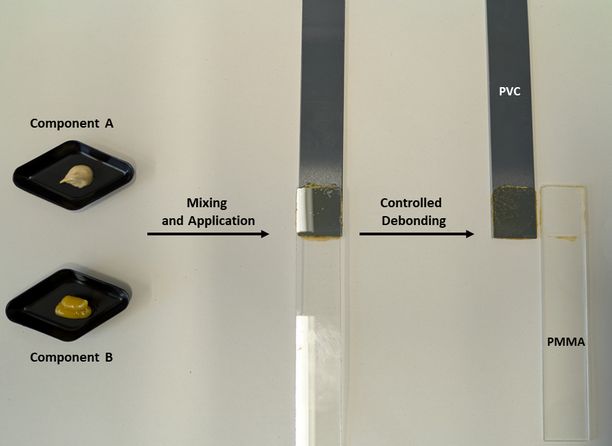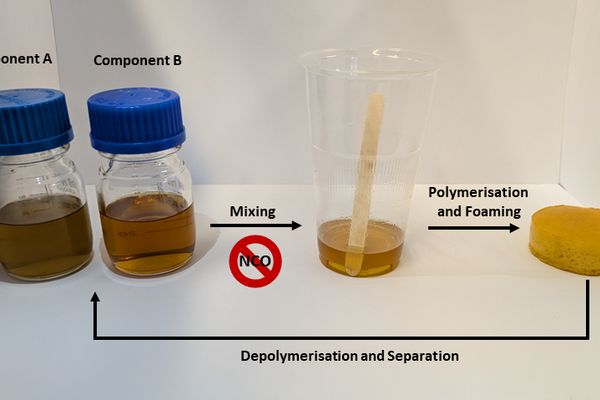Summary
- Profile Type
- Technology offer
- POD Reference
- TODE20250326023
- Term of Validity
- 26 March 2025 - 26 March 2026
- Company's Country
- Germany
- Type of partnership
- Commercial agreement with technical assistance
- Research and development cooperation agreement
- Targeted Countries
- All countries
Contact the EEN partner nearest to you for more information.
Find my local partner
General information
- Short Summary
- A German university offers a technology (TRL3) that enables environmentally friendly production and recycling of polymers through targeted depolymerization. It allows a loss-free return to monomers and thus a true circular economy - without any quality loss. It offers companies a sustainable solution for reducing CO₂ emissions and complying with regulatory requirements. Partners are sought for joint further development, adaptation to specific applications and production or project partnerships
- Full Description
-
The sustainable plastics market is growing rapidily, since CO₂ emissions reduction and plastics industry decarbonization are becoming increasingly important. Bio-based and recyclable polymers, which do not require fossil resources, but instead use renewable ones, represent a promising alternative to conventional plastics. They thus reduce pollution and promote a sustainable recycling economy. An important trend in the plastics industry is the transition from linear value-added chains to a true recycling economy.
A German university offers an invention that is an innovative concept for environmentally friendly manufacture of polymers and their complete recycling by means of targeted depolymerization into monomers.
While conventional recycling is often associated with loss of quality (downcycling), this invention allows simple separation of composite materials (enabling recycling). New polymers can thus be manufactured without material losses, which is both ecologically and economically advantageous. Given rising sustainability requirements for industry and regulatory requirements such as the EU Green Deal, demand for innovative plastics recycling solutions is growing. Companies are investing more and more in sustainable materials and closed-loop recycling to meet the rising expectations of lawmakers and consumers. The technology introduced here addresses these requirements directly and could play a key role in the development of new, environmentally friendly plastics.Initial laboratory-standard tests have been performed with satisfactory results (TRL3).
The global bio-based plastics market is growing continuously, driven by stricter environmental regulations and increasing consumer interest in sustainable products. The technology introduced here can be used in a number of industries, including the following:
▪ Foam industry
▪ Adhesives industry
▪ Carmaking
▪ Electronics
▪ Medical technology
In the face of increasingly strict legal requirements for plastics recycling (the EU Green Deal, international bans on single-use plastics, etc.), the technology offers a future-proof solution for sustainable material cycles. - Advantages and Innovations
-
In contrast to conventional recycling processes, it allows a loss-free return to monomers and thus a true circular economy - without any loss of quality.
It is characterised by
• Sustainability
• Efficient recycling
• Recycling economy
• CO₂ Reduction
• Economic potential - Stage of Development
- Lab tested
- Sustainable Development Goals
- Goal 9: Industry, Innovation and Infrastructure
- Goal 12: Responsible Consumption and Production
- IPR status
- IPR applied but not yet granted
- IPR notes
- Initial laboratory-standard tests have been performed with satisfactory results. The invention has been registered with the German Patent and Trade Mark Office, and other subsequent international applications can be made in the priority year.
Partner Sought
- Expected Role of a Partner
-
The university is looking for industrial partners for refining the technology and implementing it in industry. The following cooperation forms are possible:
▪ Joint development and adaptation to specific applications
▪ Production partnerships/projects funded by third parties - Type and Size of Partner
- Big company
- SME <=10
- SME 11-49
- SME 50 - 249
- Type of partnership
- Commercial agreement with technical assistance
- Research and development cooperation agreement
Dissemination
- Technology keywords
- 02007014 - Plastics, Polymers
- 10003004 - Recycling, Recovery
- 06006004 - Biopolymers
- Market keywords
- 08001016 - Commodity chemicals and polymers
- 08001018 - Polymer (plastics) materials
- 08004004 - Other pollution and recycling related
- Targeted countries
- All countries

